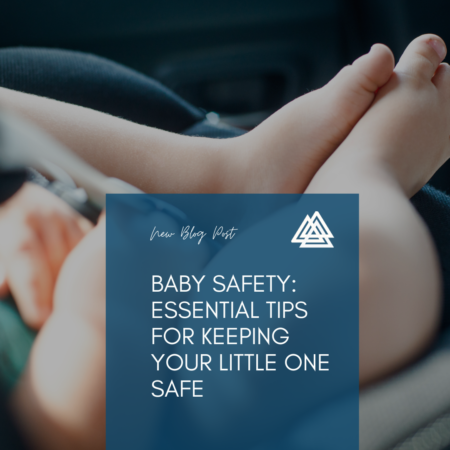 Ensuring the safety of your baby is a top priority for every parent and caregiver. Babies are naturally curious and vulnerable, making it essential to create a safe environment where they can explore and grow. From the nursery to the car, here are some key tips to help you keep your little one safe at all times.
Ensuring the safety of your baby is a top priority for every parent and caregiver. Babies are naturally curious and vulnerable, making it essential to create a safe environment where they can explore and grow. From the nursery to the car, here are some key tips to help you keep your little one safe at all times.
- Safe Sleep Practices
Sleep safety is crucial for preventing sudden infant death syndrome (SIDS) and other sleep-related incidents. To ensure your baby sleeps safely:
- Place your baby on their back: Always put your baby to sleep on their back, as this position reduces the risk of SIDS.
- Use a firm mattress: Ensure your baby’s crib has a firm mattress covered with a fitted sheet. Avoid using soft bedding, pillows, or stuffed animals in the crib, as they can pose suffocation hazards.
- Keep the crib bare: The safest sleep environment is a bare crib with just a fitted sheet. Avoid placing any loose items or toys in the crib.
- Share a room, not a bed: It’s recommended to keep your baby’s crib in your room for the first six months, but avoid bed-sharing, as it increases the risk of suffocation and SIDS.
- Car Seat Safety
Car seats are essential for protecting your baby during travel, but they must be used correctly to be effective:
- Use the right car seat: Choose a car seat that’s appropriate for your baby’s age, weight, and height. Infants should be placed in a rear-facing car seat until at least age two or until they reach the highest weight or height allowed by the car seat manufacturer.
- Install the car seat correctly: Follow the manufacturer’s instructions carefully when installing the car seat. Make sure the seat is securely fastened, and the harness fits snugly over your baby’s shoulders and chest.
- Avoid bulky clothing: When strapping your baby into the car seat, avoid using bulky clothing or blankets, as they can interfere with the harness. Instead, dress your baby in thin layers and use a blanket over the harness if needed.
- Home Safety
Your home should be a safe space for your baby to explore. Here are some tips to baby-proof your home:
- Install safety gates: Use safety gates to block off stairs and other hazardous areas. Make sure the gates are securely mounted and cannot be easily dislodged by your baby.
- Secure furniture: Anchor heavy furniture, such as bookshelves and dressers, to the wall to prevent tipping. Keep sharp objects, small items, and cords out of your baby’s reach.
- Use outlet covers: Place outlet covers on all unused electrical outlets to prevent your baby from sticking fingers or objects into them.
- Check for choking hazards: Regularly inspect your home for small items that could pose a choking risk, such as coins, buttons, and small toys. Keep these items out of your baby’s reach.
- Bath Time Safety
Bath time can be fun, but it’s important to be vigilant to prevent accidents:
- Never leave your baby unattended: Even for a moment, never leave your baby alone in the bath. Drowning can happen quickly and silently, even in shallow water.
- Check water temperature: Make sure the bathwater is warm, not hot. Test the water with your wrist or elbow to ensure it’s a safe temperature for your baby.
- Use non-slip mats: Place non-slip mats in the bathtub and on the bathroom floor to prevent slipping.
- Toys and Playtime Safety
Toys are an essential part of your baby’s development, but they should be safe and age-appropriate:
- Choose age-appropriate toys: Always select toys that are suitable for your baby’s age and developmental stage. Avoid toys with small parts, sharp edges, or strings that could pose choking or strangulation hazards.
- Regularly inspect toys: Check your baby’s toys regularly for wear and tear. Discard any broken or damaged toys to prevent injuries.
- Supervise playtime: Always supervise your baby during playtime, especially when they are playing with new toys or in unfamiliar environments.
Baby safety is all about being proactive and vigilant. By following these essential safety tips, you can create a secure environment where your baby can thrive. Remember, accidents can happen in an instant, so staying informed and prepared is key to keeping your little one safe. Whether at home, on the road, or at play, taking these precautions will help ensure your baby’s safety and well-being.
